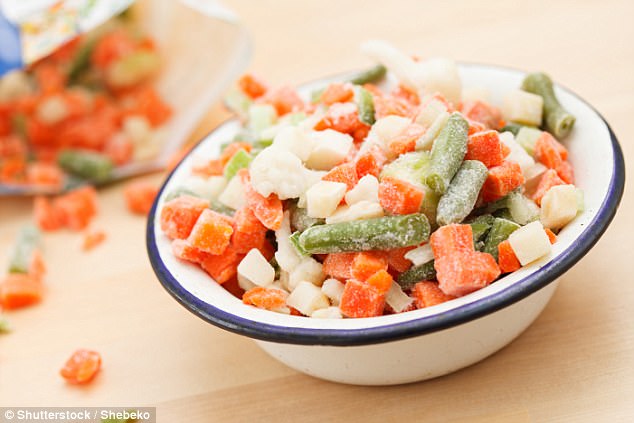We’re taught that fresh is best when it comes to our diet, but that’s not always the case.
For many of us grabbing a packet of vegetables from the freezer during our weekly supermarket shop and heating them up at home is a quicker and easier solution – but surprisingly it could also be healthier.
FEMAIL spoke to Sydney-based dietitian, Lyndi Cohen, about the benefits of frozen veggies.
‘Both frozen and fresh vegetables are exceptionally healthy and good for you. In fact, frozen vegetables may even contain more nutrients than fresh,’ said Ms Cohen.
‘Fresh is not necessarily healthier than frozen vegetables. Once harvested, vegetables start to lose nutrients and antioxidants.
‘Frozen vegetables are mostly ‘snap frozen’, an almost instantaneous freezing process designed to preserve nutrients.
‘This keeps the vegetables fresh. When you defrost them at home, there’s been minimal loss of nutrients so even though the produce has been frozen, it’s incredibly fresh!’
In addition, Ms Cohen said frozen vegetables contain significantly more vitamin C after 12 months than fresh produce after seven days in the fridge.
‘Vegetables lose nutrients when they are exposed to oxygen as well as warm and dry air.
‘The frozen conditions of the freezer prevent the loss of enzymes, antioxidants and nutrients,’ she added.
‘Some nutrients can be sensitive to cold, such as vitamin C. Freezing may reduce the amount of vitamin C by about 20-30 per cent in broccoli and green peas but has negligible effects on carrots.’
Ms Cohen also revealed that asparagus, mushrooms and sweetcorn tend to lose nutrients much faster once harvested.
One study of 1000 Australian adults by the University of Sydney found that only six per cent of people ate the recommended five serves or more of vegetables daily.
‘Just knowing you should eat your veggies has not proven enough. Consumption even in developed countries falls short of the daily intake recommended by the World Health Organisation,’ said Reetica Rekhy from the University of Sydney.
Although eating the recommended number of servings of vegetables a day may seem like an impossible task for the average Australian adult, Ms Cohen said that buying frozen vegetables might make it easier.
‘Health is about consistency and in our busy life, you need to rely on convenience options to be able to eat a healthy diet.
‘If eating frozen and canned vegetables means you eat more veg in the week, it’s a wonderful thing.
‘It’s far more valuable to have frozen or canned vegetables than no vegetables at all,’ she concluded.












